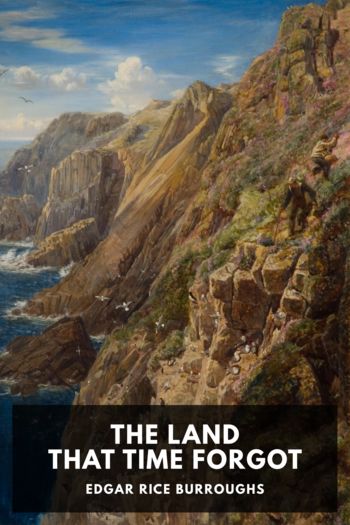South!, Ernest Shackleton [good books to read in english TXT] 📗

- Author: Ernest Shackleton
Book online «South!, Ernest Shackleton [good books to read in english TXT] 📗». Author Ernest Shackleton
The floe was not so solid as it appeared. We had reminders occasionally that the greedy sea was very close, and that the floe was but a treacherous friend, which might open suddenly beneath us. Towards the end of the month I had our store of seal meat and blubber brought aboard. The depth as recorded by a sounding on the last day of March was 256 fathoms. The continuous shoaling from 606 fathoms in a drift of 39 miles N. 26° W. in thirty days was interesting. The sea shoaled as we went north, either to east or to west, and the fact suggested that the contour-lines ran east and west, roughly. Our total drift between January 19, when the ship was frozen in, and March 31, a period of seventy-one days, had been 95 miles in a N. 80° W. direction. The icebergs around us had not changed their relative positions.
The sun sank lower in the sky, the temperatures became lower, and the Endurance felt the grip of the icy hand of winter. Two northeasterly gales in the early part of April assisted to consolidate the pack. The young ice was thickening rapidly, and though leads were visible occasionally from the ship, no opening of a considerable size appeared in our neighbourhood. In the early morning of April 1 we listened again for the wireless signals from Port Stanley. The crew had lashed three 20 ft. rickers to the mastheads in order to increase the spread of our aerials, but still we failed to hear anything. The rickers had to come down subsequently, since we found that the gear could not carry the accumulating weight of rime. Soundings proved that the sea continued to shoal as the Endurance drifted to the northwest. The depth on April 2 was 262 fathoms, with a bottom of glacial mud. Four weeks later a sounding gave 172 fathoms. The presence of grit in the bottom samples towards the end of the month suggested that we were approaching land again.
The month was not uneventful. During the night of the 3rd we heard the ice grinding to the eastward, and in the morning we saw that young ice was rafted 8 to 10 ft. high in places. This was the first murmur of the danger that was to reach menacing proportions in later months. The ice was heard grinding and creaking during the 4th and the ship vibrated slightly. The movement of the floe was sufficiently pronounced to interfere with the magnetic work. I gave orders that accumulations of snow, ice, and rubbish alongside the Endurance should be shovelled away, so that in case of pressure there would be no weight against the topsides to check the ship rising above the ice. All hands were busy with pick and shovel during the day, and moved many tons of material. Again, on the 9th, there were signs of pressure. Young ice was piled up to a height of 11 ft. astern of the ship, and the old floe was cracked in places. The movement was not serious, but I realized that it might be the beginning of trouble for the Expedition. We brought certain stores aboard and provided space on deck for the dogs in case they had to be removed from the floe at short notice. We had run a 500-fathom steel wire round the ship, snow-huts, and kennels, with a loop out to the lead ahead, where the dredge was used. This wire was supported on ice-pillars, and it served as a guide in bad weather when the view was obscured by driving snow and a man might have lost himself altogether. I had this wire cut in five places, since otherwise it might have been dragged across our section of the floe with damaging effect in the event of the ice splitting suddenly.
The dogs had been divided into six teams of nine dogs each. Wild, Crean, Macklin, McIlroy, Marston, and Hurley each had charge of a team, and were fully responsible for the exercising, training, and feeding of their own dogs. They called in one of the surgeons when an animal was sick. We were still losing some dogs through worms, and it was unfortunate that the doctors had not the proper remedies. Worm-powders were to have been provided by the expert Canadian dog-driver I had engaged before sailing for the south, and when this man did not join the Expedition the matter was overlooked. We had fifty-four dogs and eight pups early in April, but several were ailing, and the number of mature dogs was reduced to fifty by the end of the month. Our store of seal meat amounted now to about 5,000 lbs., and I calculated that we had enough meat and blubber to feed the dogs for ninety days without trenching upon the sledging rations. The teams were working well, often with heavy loads. The biggest dog was Hercules, who tipped the beam at 86 lbs. Samson was 11 lbs. lighter, but he justified his name one day by starting off at a smart pace with a sledge carrying 200 lbs.





Comments (0)